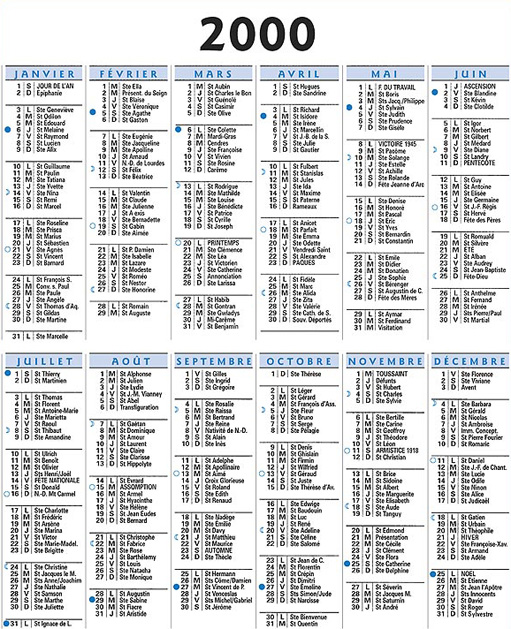2 Les Français en congé
In the second video sequence various people tell us when they take their holidays and explain why they do so. Before watching them, check whether you know how to talk about months and seasons in French.
Grammar Point 3 Talking about months and seasons
Months
When talking about months, several constructions are possible.
Use the name of the month on its own, without an article, or use the expression le mois de before the name of the month. The first letter of a month is not capitalised, except at the start of a sentence.
Février est le mois idéal pour aller skier.
J'aime bien le mois d'août à Paris. La ville est déserte.
-
Moi, je préfère octobre, ou novembre. Il y a plus d'ambiance.
-
When stating which month something happens in, use the relevant preposition(s) (such as en, après, avant, de … à) before the name of the month or combined with the expression le mois de. (Note however that en cannot be used with le mois de.)
Cette année, nous prenons nos vacances en juillet/au mois de juillet.
J'aime la plage soit avant, soit après août/le mois d'août.
Il ne fait pas trop chaud et il y a beaucoup moins de monde.
Il fait très beau ici d'avril à septembre/du mois d'avril au mois de septembre.
When talking about the beginning, middle or end of a month, use début, la mi- or fin before the name of the month (use la fin if preceded by a preposition).
Je vais en vacances chez mes parents début juillet mais je reviens à Paris fin septembre. Mes cours à l'université recommencent vers la mi-octobre.
Nous partons six semaines à la montagne: de la mi-décembre à la fin janvier.
Seasons
To say which season something is in or happens in, use en, le or au as follows:
en été orl'été in (the) summer
en hiver orl'hiver in (the) winter
en automne in (the) autumn
au printemps in (the) spring
Note that le is not used with automne and printemps, except with dernier and prochain:
Je vais pêcher en Autriche l'automne prochain.
Le printemps dernier j'ai fait du bateau en Grèce.
Key point 3: Predicting information
Before you watch a video sequence or listen to an audio extract, try to think about the vocabulary that you are likely to hear on it or the way people are going to express their views or feelings, based on any title and whatever you already know about the content. Anticipating what people say should help your understanding when it comes to watching or listening. This is why from time to time we will ask you to predict what sort of answers the participants have given, as in the next activity.
You will be
Predicting information
Talking about holiday patterns
Stating a reason
Activité 5
Voici la liste des personnes interviewées dans la séquence vidéo, ainsi que leur profession:
Madame Morand, responsable d'un stand de pâtisserie et confiserie aux Galeries Lafayette;
Jacqueline, fleuriste;
Madame Biret, gérante d'une boutique de souvenirs sur les Champs-Élysées;
Max, qui joue de la clarinette dans les rues;
Maître Bourgeois, avocat d'affaires;
Dominique Isaac, agent de police;
Médina, étudiante en psychologie;
Philippe, qui dirige plusieurs journaux et un site Internet.

Nous leur avons posé les questions suivantes:
1 Combien de jours de vacances avez-vous par an?
2 Quand prenez-vous vos vacances et pourquoi?
Essayez de deviner la réponse de chacun. Voici un exemple pour une personne imaginaire:
Gérard Blond, restaurateur
"Très très peu!"
"En février, parce que c'est un mois assez calme pour les restaurateurs."
Activité 6 LES FRANÇAIS EN CONGÉ 04:26–07:20
Regardez (plusieurs fois s'il le faut) la séquence vidéo et écrivez le nom de chaque personne en face de ce qu'elle a dit.
Pour vous aider
ne me permettent pas de don't allow me to
j'ai la chance d'avoir I'm lucky enough to have
Pâques Easter
Click to view video 04:26 – 07:20
Transcript: LES FRANÇAIS EN CONGÉ
Grammar Point 4 Stating a reason
1 An easy way of stating a reason is to use c'est + a suitable adjective or phrase.
VÉRONIQUE Pourquoi ne prends-tu pas tes vacances au mois de juin?
CHLOÉ Juin, c'est impossible: mon fils va à l'école.
CHRISTIAN Pourquoi est-ce que tu ne pars pas en vacances cette année?
SERGE C'est hors de question. J'ai trop de travail!
RACHEL Pourquoi ne prenez-vous pas le train?
JULIETTE La voiture, c'est plus pratique et, quand on est quatre, c'est beaucoup moins cher.
JÉRÉMIE Nous partons en février, c'est le meilleur moment pour le ski.
EVELYNE Moi, je pars au printemps, c'est la meilleure époque de l'année pour visiter la Provence.
Remember that if you are talking about the weather, you must always use il fait (not c'est) + an adjective or noun.
HUGUES L'été, à Marseille, il fait trop chaud. En août, je veux aller en Normandie: il fait plus frais.
VALÉRIE Oui mais, en Normandie, il ne fait pas toujours beau! Allons sur la côte ouest, alors?
HUGUES Non, il fait souvent du vent.
2 A reason can also be introduced by:
(a) parce que + a clause (parce que is sometimes preceded by the expressions (tout) simplement or purement et simplement, which emphasise the inevitability of the reason):
-
MADAME MORAND Vous partez en août? Pourquoi?
JACQUELINE Tout simplement parce que c'est le mois le plus calme pour les fleuristes.
-
(b) à cause de + a noun or pronoun:
MADAME MORAND Moi, je pars aussi en août, à cause de mon fils. Je n'aime pas partir au mois d'août mais nous sommes obligés, à cause de lui.
3 You can also use verbs or phrases that express choice (such as préférer or aimer mieux) + an infinitive, or verbs that express what you think (such as penser or trouver) + que.
Tu préfères éviter Édimbourg pendant le festival? Tu penses qu'il y a trop de touristes?
J'aime mieux prendre une semaine de vacances de temps en temps. Je trouve qu'un mois entier, c'est trop long.
4 Finally you may remember the reason Philippe gave, using depuis que:
Depuis que je suis marié à Médina, je prends mes vacances l'été.
SinceI have been married to Médina, I have been taking my holidays in the summer.
Note the use of the present tense in French in both parts of the sentence. Here is another example:
Depuis que j'ai une maison en Corse, je passe tous mes étés là-bas.
Since I have had a house in Corsica, I have been spending all my summers there.
Activité 7 EXTRAIT 2
Écoutez et répétez les phrases de l'extrait 2.
Concentrate on the pronunciation and intonation. Be particularly careful with those words that are similar in French and in English. For example (refer to your Course Guide for a list of phonetic symbols):
novembre ‘em’ is pronounced [ã] as in an (‘year’); the full word is pronounced ‘nov anbre’ , not‘novemmber’;
impossible ‘im' is pronounced as in mat in; the full word is pronounced ‘ in possible’ not‘immpossibel’. When this word needs to be emphasised, stress the first syllable (‘ im possible’) not the second (im poss ible').
Do not feel you have to do this exercise all in one go. You can start it and then come back to it later.
Audio Track 2
Transcript: Audio Track 2
Key point 4: Reinforcing learning by repetition
Repetition helps you not only to acquire the correct pronunciation of useful phrases, but also to memorise them. If you find this kind of exercise a little monotonous, try varying the way you say each sentence by using different tones or pitches. The same phrase can be said harshly or softly, authoritatively or casually. In any case, ‘little and often’ is the key here, so you should do this type of exercise a few times until each phrase becomes familiar.
Activité 8 EXTRAIT 3
Répondez aux questions de l'extrait 3 selon les indications données en anglais.
Exemple
Vous entendez: Quand prenez-vous vos vacances?
(Since I've been retired, I've been taking my holidays when I like.)
Vous dites: Depuis que je suis à la retraite, je prends mes vacances quand je veux.
Remember that you can pause the audio and replay any part as often as you need to.
Audio Track 3
Transcript: Audio Track 3
Key point 5: Making oral presentations
During many language courses you might take you may sometimes be asked to make oral presentations. No matter how long or short the presentation, you should follow these steps.
Preparing: Jot down some notes. In order to save time, you may want to use symbols such as ‘=’ (‘equals’/‘means’) or ‘→’ (direction/consequence). Notes are a personal thing and you need to experiment to find what suits you best.
Speaking: Always speak from your notes rather than reading out a prepared text. This will help you to speak more expressively. Remember to speak clearly, and do not rush as this increases the risk of stumbling over words. Practise a few times (perhaps in front of a mirror, as this encourages expression), then record yourself.
Assessing yourself: Listen to your recording and assess your speed, your delivery and the accuracy of your French. If you are not satisfied, record your presentation again
Activité 9 EXTRAIT 4
1 Voici le texte d'une présentation où une Française, Estelle, explique quand elle et sa famille prennent leurs vacances et pour quelles raisons. Elle parle aussi de son amie Danièle.
Nous prenons généralement nos vacances vers la mi-septembre, parce que c'est le meilleur moment: il ne fait pas trop chaud et il n'y a pas trop de monde sur les plages. Mais septembre, c'est impossible pour mon amie Danièle. Depuis que ses enfants vont à l'école, elle part en juillet ou en août.
2 Imaginez que vous êtes Estelle.
(a) Préparez les notes pour votre présentation.
These notes will help you remember the main points of Estelle's presentation.
(b) Maintenant utilisez vos notes pour enregistrer une présentation sur une cassette personnelle/sur votre ordinateur. Ne lisez pas le texte ci-dessus!
Make sure you follow steps 2 and 3 in ‘Making oral presentations’ above. Aim to speak for about thirty seconds.
3 Écoutez l'extrait où est enregistrée la présentation d'Estelle.
In the light of what you have heard you might like to make changes to your own presentation.
Audio Track 4
Transcript: Audio Track 4
Activité 10
You will need a tape recorder or audio-recording device on your computer for this exercise. Faites votre propre présentation orale. Parlez pendant vingt-cinq à trente secondes. Vous devez:
expliquer quand vous prenez vos vacances et pour quelles raisons (si vous ne partez jamais en vacances, expliquez pourquoi);
parler d'un(e) ami(e) qui prend ses vacances à un moment différent de l'année et dire pourquoi il/elle le fait.
Prepare your notes first, practise speaking then record yourself, referring only to your notes. Speak clearly and put as much expression as you can into your delivery. When you have finished, listen to your recording. If you are not entirely satisfied, repeat the process.

